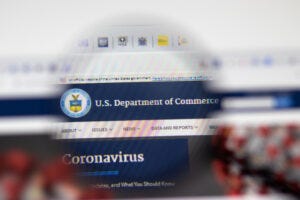
A China-based subsidiary of CDMO WuXi Biologics can again receive certain imported bioprocess equipment after being removed from the US Government’s Unverified List (UVL).
Back in February, the US Commerce Department included two subsidiaries of WuXi Biologics based in Shanghai and Wuxi – among 33 Chinese companies – to the list, restricting their ability to import certain items subject to the Export Administration Regulations (EAR) from the US.
At the time, the contract development and manufacturing organization (CDMO) said the decision to restrict imports was due to the inability of US Government agencies to undertake required end-use verifications at the facilities due to the COVID-19 pandemic.

Image: DepositPhotos/
postmodernstudio
But as of October 7, the WuXi City-based subsidiary has been removed from the UVL, following an on-site end-use check in June conducted by the US Department of Commerce, in coordination with China’s Ministry of Commerce (MOFCOM).
“WuXi Biologics has always committed to operating with the highest standard of compliance and in accordance with relevant guidelines and regulations,” the firm said.
“The company is also working closely with relevant government authorities to schedule the on-site end-use check of its other subsidiary, WuXi Biologics (Shanghai) Co., Ltd., and will commence the UVL delisting process for such entity as soon as the check is completed.”
According to supply chain consultants BDP, “the UVL lists names of companies that the Bureau of Industry Security (BIS) could not verify as bona fide because an end-user check could not be completed to a satisfactory level.”
MAb partnership with Toregem
In related news, WuXi’s Shanghai subsidiary has signed a Memorandum of Understanding (MoU) with Toregem BioPharma, a Kyoto University biotech startup, to develop TRG035, a monoclonal antibody targeting USAG-1 for congenital adentia.
TRG035 is a tooth regeneration antibody drug based on the research results of Dr. Katsu Takahashi, Oral and Maxillofacial Surgery, Kyoto University. Although most adults have a full set of 32 teeth, about 1% of the population has more or fewer due to congenital conditions. USAG-1 is a bifunctional protein that antagonizes BMP and Wnt, two signaling molecules essential for tooth development.
Currently, missing teeth can be addressed only with implants and other artificial measures. Toregem believes its candidate shows that monoclonal antibodies can regenerate teeth.
WuXi Biologics said it would support Toregem BioPharma on the TRG035 project for its IND application, though details of the agreement were not disclosed. The partnership will give Toregem access to WuXi Biologics’ full range of expertise, including integrated CMC services in cell line development, cell banking and testing services, cell culture development, biologics GMP manufacturing, bioassay development, and related services.
“We are glad to be collaborating with WuXi Biologics as they are experienced in enabling universities to turn advanced technologies into promising products,” said Honoka Kiso, CEO of Toregem BioPharma.
“By utilizing WuXi Biologics’ comprehensive IND-enabling capabilities and large global footprint with extensive GMP production capacities, Toregem BioPharma will be able to focus on realizing and maximizing the therapeutic potential of TRG035.”
Chris Chen, CEO of WuXi Biologics, said, “We are very pleased to partner with Toregem BioPharma, and this is one of the first integrated CMC projects in Japan that we have supported – with our integrated services and experience – from early academic research phase all the way to clinical phase.”
The Phase I clinical study of TRG035 is expected to start in early 2024.
Some of the second part of this article has been adapted from a ChinaBio Today piece, published on October 12.
About the Author
You May Also Like

schedl_b_and_w.jpg?width=100&auto=webp&quality=80&disable=upscale)
schedl_b_and_w.jpg?width=400&auto=webp&quality=80&disable=upscale)



